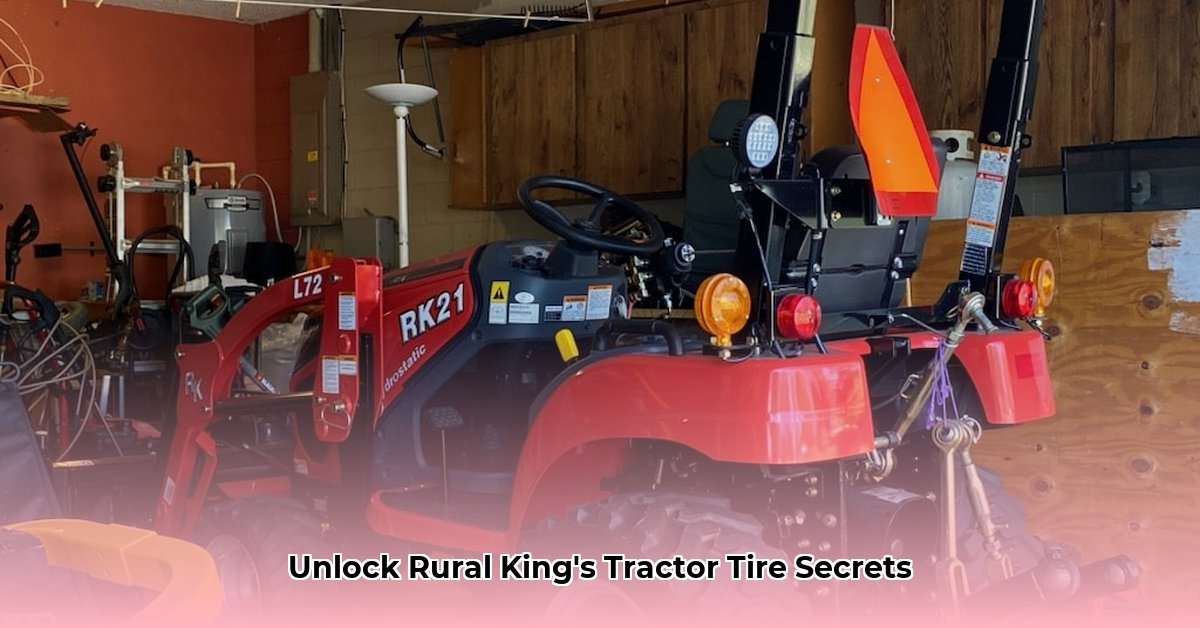
Finding the right tractor tires can significantly impact your farm's efficiency and profitability. This guide focuses on Rural King tractor tires, helping you navigate the selection process, understand key specifications, and maintain your tires for optimal performance. We'll also compare Rural King's offerings to competitors, ensuring you make the most informed decision. For more tire options, check out these 15-inch front tires.
Understanding Your Tractor's Needs: Matching Tires to Tasks
Before diving into Rural King's selection, assess your tractor's workload. Is it primarily used for heavy fieldwork, light yard work, or a combination of tasks? The type of tire you need directly correlates to these tasks. Deep-tread agricultural tires excel in muddy fields, maximizing traction for plowing and planting. Conversely, smoother turf tires are ideal for delicate landscaping, preventing soil compaction and damage to lawns. For diverse applications, industrial tires provide a balance of performance and durability. Choosing the wrong tire is like wearing hiking boots to a formal event; it simply isn't practical. What type of work demands the most from your tractor?
Rural King's Tractor Tire Lineup: Options for Every Application
Rural King typically offers agricultural, turf, and industrial tractor tires. Agricultural tires, designed for heavy fieldwork, prioritize traction and durability in challenging terrains. These tires often feature aggressive tread patterns and high ply ratings to withstand the rigors of plowing, planting, and harvesting. Turf tires, designed for lawn care and other landscaping tasks, prioritize minimizing soil compaction and damage to delicate surfaces. Their smoother tread pattern and lower ply ratings offer better performance on lawns and smoother surfaces. Industrial tires often represent a compromise between the two, suitable for a range of uses on less demanding surfaces. Do Rural King's options align with the variety needed for your diverse farming operations?
Key Specifications: Size, Ply Rating, and Tread Pattern
Selecting the right tires involves understanding key specifications:
- Tire Size: Crucial for proper fit and performance. Always consult your tractor's manual for recommended sizes. Using incorrect sizes can negatively impact handling and performance, even leading to equipment damage.
- Ply Rating: Indicates tire strength and load-bearing capacity. Higher ply ratings denote increased durability and weight capacity, though usually at a higher cost. Higher ply ratings are generally necessary for heavier tasks.
- Tread Pattern: Affects traction and soil compaction. Aggressive, deep-lug patterns excel in muddy conditions. Shallower treads are better for paved surfaces or where soil compaction is a concern. Would you prefer more aggressive treads for your typical work conditions, or are smoother treads more suitable to your workload?
Here's a table summarizing these key features:
| Feature | Description | Impact on Choice |
|---|---|---|
| Tire Size | Diameter and width, must precisely match your tractor's specifications. | Crucial for correct fit, optimal performance, and preventing damage. |
| Ply Rating | Indicates strength and load capacity. Higher ratings mean greater durability. | Higher rating needed for heavy loads, impacting both cost and durability. |
| Tread Pattern | Design of the tire surface; impacts traction and soil compaction. | Deep lugs ideal for mud; shallower treads for pavement and lawns. |
Rural King Tire Value: Price vs. Performance
Rural King often offers competitively priced tractor tires. However, remember that "value" goes beyond the initial cost. A cheaper tire with a shorter lifespan may cost more in the long run than a slightly more expensive, durable tire. Consider the total cost of ownership, balancing the initial price with the expected lifespan and performance. Does the potential long-term cost savings of a premium tire outweigh the initial investment?
Maintaining Your Investment: Essential Tire Care
Proper tire maintenance significantly extends tire life and ensures optimal tractor performance.
- Regular Inflation: Maintain correct tire pressure as specified by the manufacturer. Underinflation leads to premature wear and reduced fuel efficiency; overinflation risks tire damage. Consistent pressure checks are crucial for optimal tire performance.
- Visual Inspections: Regularly check tires for cuts, punctures, or unusual wear patterns. Addressing issues early prevents major problems.
- Tire Rotation: Rotate tires regularly for even wear across all four positions. This extends the life of all four tires equally.
- Proper Storage: Store tires in a dry, cool location, away from direct sunlight and extreme temperatures, to avoid premature aging and cracking. Following these steps will help maintain a high level of performance.
Comparing Rural King to Competitors: Finding the Best Deal
Before committing to a purchase, compare prices and specifications at other agricultural supply stores like Tractor Supply Company. While Rural King offers convenient access for many, competitor pricing may provide better value depending on your specific needs and location.
Key Takeaways: Making the Right Choice
Choosing the right Rural King tractor tires requires careful consideration of your tractor's tasks, the tire's specifications (size, ply rating, and tread pattern), and a realistic assessment of your budget. Remember, proper maintenance is key to prolonging your investment and ensuring your tires perform optimally. By understanding these factors, you can optimize your tractor's performance and enhance your overall farm operations.